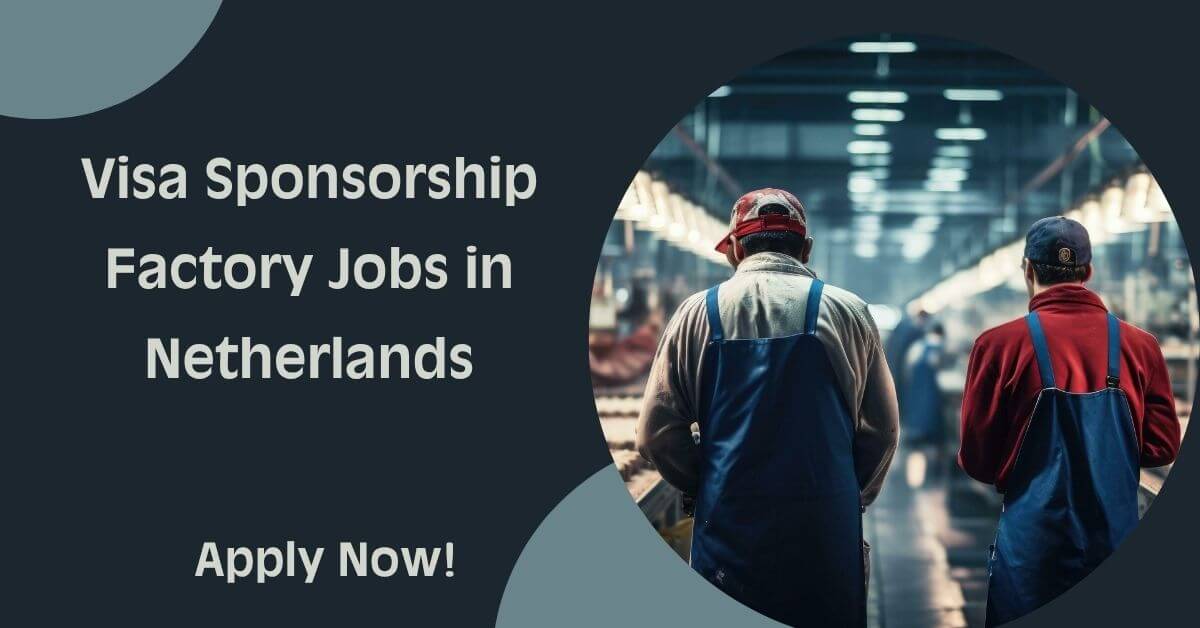Factory Jobs in Europe With Visa Sponsorship 2025
Are you ready to embark on the journey of establishing a new epoch in Europe? A combination of visa sponsorship and factory work in Europe presents an exceptional opportunity to participate in the continent’s mechanical scene and establish significant international connections. We will delve into the straightforward aspects of these professions, including a summary of the work obligations, prerequisites, benefits, and the application process.
The thriving fabricating sector in Europe is supported by factory employment, in which individuals significantly contribute to the development of products that exert control over various industries.
Visa-sponsored factory jobs in Europe provide an unparalleled opportunity to contribute to the continent’s manufacturing capacity while gaining international recognition. As members of the workforce who are adequately trained, manufacturing facility laborers play a significant role in the development of goods that impact numerous industries. Those who are willing to engage in a manufacturing process that involves electrical and social progress should contemplate pursuing post-factory employment opportunities in Europe.
Check Also: Visa Sponsorship Factory Worker Jobs in Canada – Apply Now
Employment Openings in Europe’s Different Factories:
While earning a living wage, employment in European industrial facilities enables a significant number of non-Europeans to reside and work in an underutilized nation. Non-natives employed in European manufacturing facilities should be cognizant of the following four types of labor:
Jobs in Agribusiness:
Agricultural processing facilities are dispersed throughout Europe and employ individuals from both domestic and foreign countries. An assortment of organic products, including livestock, vegetables, and dairy products, are produced within these frameworks. Although the work is often physically demanding, it is well-compensated and offers various benefits.
Production of clothes:
Articles of apparel constitute one of the most dynamic industries in Europe. To fulfill the demand for apparel from customers worldwide, a multitude of companies are actively seeking competent specialists. Individuals with experience operating stitching machines and manipulating textiles from a previous country may be better suited for this type of assembly line labor.
Producing Cars and Trucks:
Automobile production is an additional expanding industry in Europe. A limited number of manufacturers are recruiting personnel to verify vehicle design, appearance, and quality. Those who possess a fundamental understanding of automotive mechanics will thrive in the current environment.
Requirements
- Working in a factory requires an abundance of patience, a strong spine, and excellent vision.
- Typically, labor in European factories entails extended work schedules and a multitude of journeys. Make arrangements to work late at night or at the end of the week, and negotiate unfavorable due dates. Anticipate a bounty of challenging labor, disturbance, and potentially hazardous machinery.
- Factory jobs are intermittently entry-level positions in Europe. Frequently, employment in European manufacturing facilities requires a bachelor’s degree or equivalent experience. In most cases, production line labor necessitates proficiency in mathematics, science, and machine operation. A limited number of plant laborers must possess specialized skills, including welding or carpentry.
Job Responsibilities:
- Factory workers are entrusted with tasks involving the collection, production, and assembly of goods by predetermined criteria.
- They ensure products satisfy quality standards by performing evaluations, tests, and inspections at various points during the manufacturing process.
- Factory worker specialists operate machinery and equipment to manufacture forms safely and efficiently.
- After the assembly of components, sections, or materials into finished goods, they package them with care.
- Factory employees supervise the production of intermediate materials.
- products, as well as packaged goods, within the factory.
- They perform essential equipment cleansing and maintenance to ensure proper operation.
Benefits of Factory Jobs in Europe:
- Consistent Employment: Frequently, long-term, stable employment opportunities are available in factories, particularly in sectors with consistent product demand.
- An array of opportunities: Factories provide employment opportunities across a broad spectrum of sectors, including but not limited to automotive, electronics, food processing, and textiles, thereby accommodating individuals with a variety of interests and skill sets.
- Entry-Level Employment: A considerable number of manufacturing positions are accessible to people with diverse levels of education and experience, as they do not necessitate advanced degrees or specialized training.
- Instruction Programs: Frequently, in order to empower employees with the knowledge and abilities required to perform their jobs effectively, factories provide on-the-job training. This provides opportunities for skill development and career advancement.
- Wages Competitive with Others: In most cases, wages at factories are competitive, particularly for specialized labor and positions requiring technical proficiency.
- Benefits Provisions: Numerous manufacturing facilities offer comprehensive benefit packages that comprise healthcare coverage, retirement provisions, paid leave, and incentives, thereby augmenting overall remuneration and job stability.
- Possibilities for Progress: There may be prospects for factory employees to advance their careers within the same organization, ascending to supervisory or managerial positions as they accumulate work experience and exhibit leadership aptitudes.
- Job Diversity: By means of a variety of duties and obligations, factories generally afford employees the opportunity to develop expertise in maintenance, logistics, production, assembly, quality control, and assembly.
- Work in Teams and Collaboration: Working in factories frequently promotes cooperation and collaboration, given that employees are required to coordinate their endeavors in order to accomplish production objectives, resolve issues, and guarantee adherence to quality standards.
- Skill Enhancement: Employment in a factory affords the chance to cultivate essential competencies, including but not limited to attention to detail, problem-solving, time management, and manual dexterity.
- Satisfaction at Work: For factory workers, witnessing the physical manifestations of their labor, such as completed products emerging from the assembly line, can engender a feeling of fulfillment and recognition.
- Implications for the Economy: By producing goods intended for both domestic consumption and export, factory employment fosters economic stability and expansion while providing assistance to local communities and industries.
How to Apply for Work in a European Factory?
As the unemployment rate in Europe continues to hover around high levels, production line jobs that offer visa sponsorship are becoming increasingly attractive. In addition to a valid visa, candidates must possess a commerce affirmation. Certain sponsors may mandate that candidates examine the scope of well-being protections before affirmation.
Contact the government office or division of the country where you intend to perform your duties. You will have the ability to obtain information regarding the application strategy and determine crucial forms from these departments.
Upon acquiring all the necessary information, initiate the application procedure by filling out an internet application form. We kindly request that you submit supporting documentation, including copies of your identification documents (such as driver’s licenses, international identification cards, and work experience certificates), along with the completed application form.
You will be redirected to the job listing website after clicking the link below. Proceed to the Apply Now page and complete the required fields.
Frequently Asked Questions:
How much do factory workers get paid in the UK?
The average salary for a factory worker is £23,597 per year in the United Kingdom. The average additional cash compensation for a factory worker in the United Kingdom is £2,782, with a range from £565 to £13,705.
What are the factory’s operations?
A factory worker performs various jobs in factories. Factory workers may operate machinery to manufacture different products. They may also sort, check, and pack products or work on product assembly. You can find this position in industrial environments.
What type of job is working in a factory?
Definition: Manufacturing jobs are defined as those that create new products either directly from raw materials or components. These jobs are usually in a factory, plant, or mill but can also be in a home, as long as products, not services, are created.



